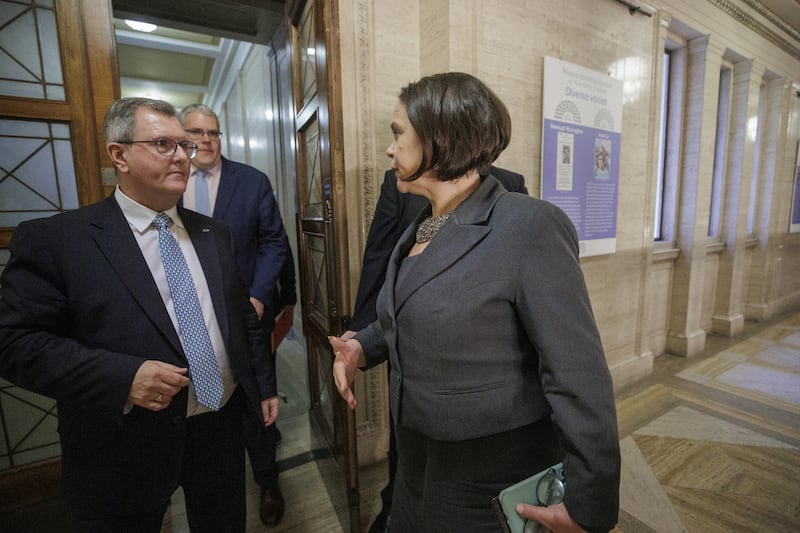Sinn Fein President Mary Lou McDonald has predicted a border poll on Northern Ireland’s constitutional future will be held before 2030.
Ms McDonald comments expressing confidence of referenda on both sides of the border within six years come amid increased focus on the prospects of the reunification following the appointment of Sinn Fein’s Michelle O’Neill as Northern Ireland’s first nationalist first minister.
“I envisage us having the referendums in this decade,” she told Sky News.
Asked to clarify if that meant before 2030, she replied: “Yes, and let me say that it is not so far away, so there’s an awful lot of work that needs to be done.
“I’ve said consistently to the government in Dublin that they really need to take possession of this conversation that’s now under way right across Ireland.
“They need to give it a structure and a place and, of course, it has to be inclusive.
“We want to hear from every voice, including those for whom reunification would not be their first option, those who go out and campaign for the union.
“Nevertheless, we all live together, that’s never going to change. We share Ireland, we love Ireland, and we want what’s best for our children, for our grandchildren.
“I think that’s the strongest, most powerful common ground that we all share.”
Speaking during a visit to Rathmore Grammar School in Belfast today, DUP Stormont Education Minister Paul Givan said: “Gerry Adams said we’d be in a united Ireland by 2016 and we’re not.
“It’s regrettable that when it comes to elections, Sinn Féin immediately pivot towards this issue of a border poll. I indicated before Michelle O’Neill became the first minister to resist the temptation to go down the path of talking about border polls when we need to be focused on health, education and all of those bread-and-butter issues.
“The public want us to get on with the job of delivering on those issues, not to be distracted by those constitutional questions.”
Under the terms of the Good Friday Agreement, a border poll should be called by the incumbent Northern Ireland Secretary when he/she believes there is evidence that public opinion in the region has shifted in favour of constitutional change.
Successive UK governments have consistently declined to specify publicly what criteria will be applied when measuring public sentiment on the issue.
Last week, Ms McDonald said unification was within “touching distance” – a claim that prompted DUP leader Sir Jeffrey Donaldson to remark that his political rival must have the “longest arms on this island”.
"Unless Mary Lou McDonald has the longest arms on this island, I don't think she's anywhere near to touching distance." Jeffrey Donaldson does not believe we are nearing a united Ireland. @PatKennyNT pic.twitter.com/1XKwuKsUNU
— NewstalkFM (@NewstalkFM) February 7, 2024
Sir Jeffrey rejected suggestions of a poll within the next decade, insisting “we are nowhere near a united Ireland”.

Ms McDonald came back on his comments today.
“When I say unity is within touching distance, I said in historic terms, I don’t mean that it’s happening next week, or next month,” she said.
“So you don’t have to have those long arms that Jeffrey refers to. But what I am saying, what I firmly believe, is in this decade we will have those referendums and it’s my job and the job of people like me who believe in reunification to convince, to win hearts and minds and to convince people of that opportunity.”
Ms O’Neill, who is in London with her party president, later accused Northern Ireland Secretary Chris Heaton-Harris of “ignoring the reality” on the issue of constitutional change.
Earlier this week, Mr Heaton-Harris said he did not expect a border poll within his lifetime.
“I think Chris Heaton-Harris, with all due respect, that’s a bit of an ostrich mentality, sticking your head in the sand and refusing to see what’s actually happening all around you,” she told ITV.
Ms O’Neill added: “I think he’s ignoring the reality. My election speaks to the change that’s happening across the island.
“My parents and grandparents never believed this day would come, that this change would never come about because the north is built in such a way that someone from my background was never supposed to be in a position of first minister.
“You know, all the old certainties of the past, of that state that they were born into, are gone.
“So I actually think that my appointment actually does reflect the change that’s happening.”








